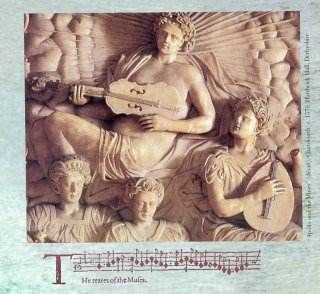Anthony HOLBORNE (c.1545? -1602)
"The teares of the Muses" 1599 - Elizabethan Consort Music Vol II
Pavans, Galliards, & Almains
 Hespèrion XXI, Jordi
Savall
Hespèrion XXI, Jordi
Savall
 ALIA VOX AV9813
[66:13]
ALIA VOX AV9813
[66:13]
Crotchet
Amazon
UK
Amazon
USA

It is always a pleasure to hear the refined yet exuberant playing of Jordi
Savall's ensemble. This new album of music by Anthony Holborne does not
disappoint.
Holborne contributed to the flowering of English art, music and letters
associated with Queen Elizabeth I. Although a lesser figure than William
Skakespeare, Sir Philip Sidney Edmund Spencer, Nicholas Hilliard and William
Byrd, Holborne's music was, nevertheless, greatly respected in his own time
and deserves wider recognition today. Holborn moved in the highest circles
(he was a courtier) and had an enviable reputation as a musician. He appears
to have been a highly-skilled performer on the lute, cittern and bandora
to judge by the music he composed for these instruments.
During the 1590s Holborne worked on his collection of Pavans, Galliards,
and Almains which was published in London in 1599 and is the source of the
music in this recording. This is the first printed dance music to appear
in England and the music is described on the title-page as being suitable
for performance on viols, violins or other Musical Wind Instruments". The
question of which instrument should play on each part is open to interpretation:
probably the most likely scoring for a performance at the time, writes Tim
Crawford in his absorbing notes, would have been for a "whole" consort of
one of the three categories mentioned.
It is an open question whether this dance music was really ever intended
for dancing. It seems likely that Holborne's music is "dance music for the
ear rather than the feet". Certainly the longer Pavans seem to be more sitting
out material; the titles give the clue - e.g. - 'The Image of Melancholy'
and 'The funerals' Furthermore, the more doleful of Holborn's pavans are
part of the well-documented Elizabethan quasi-cult of "melancholy". The galliards
and almaines on the other hand, are frequently toe-tappingly bright. And,
with titles like: 'Heigh ho holiday', 'The Honie-suckle' and 'The Fairie-round'
surely Elizabethan dance floors must have been thronged.
The 25 numbers are sub-divided into six suites. For the slower pavans, Savall
invests a melancholy dignity; while, for the brighter pieces, his players
are alert to the lively and sometimes engagingly twisting rhythms. Overall,
he brings out all the beautiful little felicities in this surprisingly complex
and often delicately strained music.
Unhesitatingly recommended
Ian Lace


Gary Dalkin adds
While volume I of Hesperion XXI's survey of Elizabethan consort music covered
the repertoire of various composers, this second disc is devoted entirely
to the music of Anthony Holborne. As usual for Alia Vox, this is a beautifully
presented, digipacked album. When, coincidental with the release of the disc,
I spoke to the leader of Hesperion XXI Jordi Savall for Classical Music on
the Web, he talked about many aspects of his music, including his concern
for good presentation. His pursuit of artistic beauty communicated strongly,
and is fulfilled here on many levels, from choice of repertoire, through
performance, recorded sound and physical presentation. Savall considers it
an artistic obligation to serve often forgotten composers well, and he has
done so here.
Anthony Holborne was born around 1545, died in 1602, and was as the booklet
points out, a lesser but still greatly respected composer (and not only composer,
but also poet and diplomat) from that musical and artistic flowering associated
with the court of the first Queen Elizabeth. In 1599 Holborne made musical
history: his Pavans, Galliards and Allmaines was the first printed
collection of dance music to appear in England, a set described as suitable
for "viols, violins or other Musicall Wind Instruments." However, many of
the pieces had previously been published in various versions including settings
for "mixed consort", so there is precedent for the addition here of renaissance
lute, orgue de chambre and tambour to Jordi Savall's ensemble of six viole
de gambe. Whether this is how the music would have sounded 400 years ago
is a mute point, for it is clear that Holborne expected this music to be
played by various forces.
This being Hespèrion XXI this is an immaculately performed recording
which probably leaves no middle ground. One either loves what Jordi Savall
does, or it leaves one cold. As such, this is a mannered, stylised presentation,
perhaps as much late 20th century romantic fantasy of the age
of Shakespeare as anything more authentic. It is also utterly lovely. There
is a detached yet paradoxically warm beauty here which enchants the more
one listens. With many of the 25 tracks simply called pavan, galliard or
almaine, sometimes with a subtitle, sometimes not, and with the overall sound
uniform throughout, it takes some time to become acclimatised to the various
pieces. Once one has, this disc reveals itself to be thoughtfully programmed
in a balanced selection of melodies which range from the sprightly, the charming
galliard which is track 8, to the sombre pavan 'The Image of Melancholly',
part of the Elizabethan 'cult of melancholy'. Those additional instruments
which transform the consort into a mixed or broken consort are employed with
taste and subtly, though some may find the drum which introduces the almaine,
'The Choice' intrusive.
Teares of the Muses is one of those albums which will sell itself. The only
real caveat is I can think of is that given the nature of the music, it is
probably best enjoyed in small concentrated doses of 20 minutes or so at
a time, rather than gulped all at once. Otherwise, this melancholy is pure
delight.
Gary S. Dalkin


